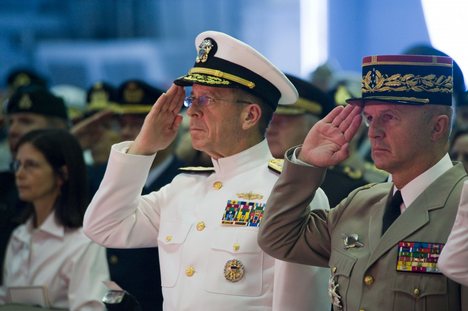Democrat November-December 2010 (Number 121)
"Anglo-French Declaration on Defence and Security Cooperation
This agreement is part of the thrust towards a European Army*

Saluting imperialism in preparation for war on behalf of either NATO or the EU or both together
A Summit between Britain and France on November 2 in London concluded with two major declarations: preventing so-called illegal immigration and the other on "Defence and Security Co-operation," namely war preparations. The two treaties pledged military cooperation and the establishment of closer relations between the armed forces and defence industries of both countries. The Prime Minister claimed the agreements "will make our citizens safer, more secure and better protected in the global age of uncertainty in which we now live," adding that the agreements "will also help us to maintain and strengthen our defences at a time when national finances are severely challenged".
The media were quick to spread disinformation that the agreement would produce savings. Notwithstanding the validity of the so-called austerity measures being imposed across the EU and elsewhere, Britain and France currently have the third and fourth largest military budgets in the world, half of the total military spending of all European countries put together.
The measures agreed include: joint missile construction and use of aircraft carriers; a joint "expeditionary force" or rapid deployment force, as well as other forms of military and military-industrial cooperation; further consolidation of the monopoly power of the armaments and "defence" industries of Britain and France. They will further bolster the military capabilities of the two countries to intervene globally, as well as creating conditions for both states to enhance their position within Europe and within the aggressive NATO alliance.
As part of the treaty, Britain and France will jointly support the expansion of the Active Layered Theatre Ballistic Missile Defence system for Europe, one of the key agenda items discussed at the NATO Summit in Lisbon. In short, the military agreements signed aimed to strengthen the military capabilities of the two countries, the EU and NATO.
President of France Nicolas Sarkozy commented that the new arrangement was "unprecedented and shows a level of trust and confidence between our two nations which is unequalled in history." Cameron spoke of a "new chapter" of co-operation between the two countries. Tony Blair's first government also made similar "unprecedented" military agreements with France at St. Malo in 1998, reported in the Democrat, preceeding the wars on Iraq and Afghanistan. The St. Malo agreements also paved the way for wider agreements on an enhanced EU military capability within NATO.
The new Anglo-French arrangement will enable similar and even more aggressive acts to be committed in the future and the "Declaration on Defence and Security Co-operation" signals the intention of the two powers to intensify their threats against Iran and the Democratic People's Republic of Korea, as well as other countries.
The main elements in the Declaration on Defence and Security Co-operation signed on November 2, 2010, by the Prime Minister and French President include:
- Nuclear weapons: A joint facility to be built at the existing Valduc research centre in France to "model performance of our nuclear warheads and materials to ensure long-term viability, security and safety." It will be supported by a Joint Technology Development centre at Aldermaston, UK.
- Combined Joint Expeditionary Force: The tri-service CJEF -- capable of involvement in anything up to "high intensity" operations -- will not be a standing force but will be available "at notice for bilateral, NATO, European Union, United Nations or other" operations. Combined land and air exercises will begin in 2011 with "progress towards full capability in subsequent years."
- Aircraft Carriers: The UK will fit the "cat and trap" system to its future aircraft carrier so that both countries fighter jets can fly from each other's naval vessels. By the early 2020s this will allow the creation of a "UK-French integrated carrier strike group."
- Airbus A400M: Final negotiations are under way for integrated support for both countries' fleets of military transport aircraft, and co-operation will be sought on training.
- Drones: Joint working on the next generation of unmanned spy planes to come into service in 2015-2020. Longer-term assessment of options for the next generation of combat drones -- not due to be operational until 2030.
- Defence industry and research: Aim to cut 30% of the cost of complex weapons systems through 10-year strategic plan including a single European prime contractor. This will act as a test for cooperation in other industrial sectors. A combined £87.5 million minimum annual research and technology budget looking at critical future areas such as electronic warfare.
- Other initiatives include a cyber security framework, joint working on specifications to deal with marine mines and the possibility of France using "spare capacity" in the UK future air-to-air refuelling fleet "provided it is financially acceptable to both nations."
The document said Britain and France have "reached a level of mutual confidence unprecedented in our history" and "do not see situations arising in which the vital interests of either nation could be threatened without the vital interests of the other also being threatened." So the two countries will "enable our forces to operate together, to maximize our capabilities and to obtain greater value for money from our investment in defence."
EU to Join NATO?
EU ambassador to the US João Marques de Almeida, an adviser to the president of the European Commission, Jose Manuel Barroso, said at the beginning of November that the best solution for the enhancement of EU-US relations would be for the European Union to join NATO.
This would remove the independence in foreign policy of the Member States who are not members of NATO.
* Based on an article in 'The Workers Daily Internet editions' with some editing and the addition of the last paragraph.